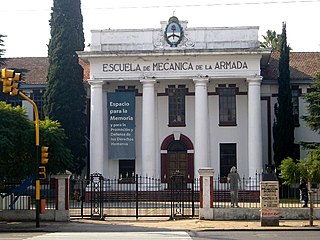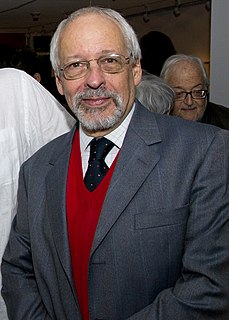 W
WThe Dirty War is the name used by the military junta or civic-military dictatorship of Argentina for the period of state terrorism in Argentina from 1976 to 1983 as a part of Operation Condor, during which military and security forces and right-wing death squads in the form of the Argentine Anticommunist Alliance hunted down any political dissidents and anyone believed to be associated with socialism, left-wing Peronism, or the Montoneros movement.
 W
WThe Higher School of Mechanics of the Navy, was originally an educational facility of the Argentine Navy. It was used as an illegal, secret detention center during the Dirty War of military dictatorship.
 W
WThe Full stop law, Ley de Punto Final, was passed by the National Congress of Argentina in 1986, three years after the end of the military dictatorship of the Proceso de Reorganización Nacional and restoration of democracy. Formally, this law is referred to by number, like all others in Argentine legislation, but Ley de Punto Final is the designation in common use, even in official speeches.
 W
WThe Grandmothers of the Plaza de Mayo is a human rights organization with the goal of finding the children stolen and illegally adopted during the 1976–1983 Argentine military dictatorship. The president is Estela Barnes de Carlotto.
 W
WThe Mansión Seré was a clandestine detention center (CCD) run by the Argentine Air Force during the self-styled National Reorganization Process (1976–1983).
 W
WThe Mothers of the Plaza 25 de Mayo, also known simply as Las Madres de Rosario or Madres Rosario, is an Argentine human rights group based in Rosario, Santa Fe Province, Argentina. The organization was created by a group of women who sought answers to the forced disappearance of their children during the Dirty War and military dictatorship from 1976 to 1983. The Mothers of the Plaza 25 de Mayo were initially founded as a Rosario-based branch of the larger, national Mothers of the Plaza de Mayo, but later developed their own association to focus on forced disappearances in Santa Fe Province.
 W
WThe Mothers of the Plaza de Mayo is an Argentine human rights association formed in response to the National Reorganization Process, the military dictatorship by Jorge Rafael Videla, with the goal of finding the desaparecidos, initially, and then determine the culprits of crimes against humanity to promote their trial and sentencing.
 W
WThe Movimiento Judío por los Derechos Humanos was a human rights organization in Argentina. It was founded by Marshall Meyer and Herman Schiller on August 19, 1983.
 W
WThe National Archive of Remembrance is an archive set up by decree 1259/2003 of the president of Argentina Néstor Kirchner on 16 December 2003 to obtain and process data pertaining to human rights violations by the Argentine State, obviously referring to events of the illegal dirty war of 1976 to 1983 waged by the state on those it perceived as its enemies.
 W
WThe People's Revolutionary Army was the military branch of the communist Workers' Revolutionary Party in Argentina.
 W
WThe Popular center of remembrance is a former illegal detention center in Rosario, province of Santa Fe, Argentina. It was used by the provincial police between 1976 and 1979, during the Dirty War, to hold people with no formal charges and torture them, under the pretense of fighting radical left-wing political subversion and terrorism. Most of the detainees were in fact social activists, political dissidents, or merely relatives or acquaintances of people that were ideologically suspect in the eyes of the military junta of the self-styled National Reorganization Process.
 W
WThe Pozo de Banfield is a former Buenos Aires Provincial Police station and a former Argentine clandestine detention center that operated between November 1974 and October 1978, during the military dictatorship that ruled the country from 1976 to 1983. This detention center was an integral part of what came to be known as the Circuito Camps and was one of the first to operate as such during the constitutional government of Isabel Martínez de Perón, nearly 18 months before the 1976 coup d'état. With the nationwide extension of the 1975 annihilation decrees, provincial police forces were placed under command of the Army, and subsequently the Banfield Investigations Brigade became subordinated to the 3rd Mechanized Infantry Regiment of the Argentine Army.
 W
WOperation Primicia ("Scoop") was a large guerrilla assault that took place on 5 October 1975, in Formosa, Argentina. It was the largest attack ever launched by the paramilitary group Putineros, which attempted to seize the barracks of the 29th Forest Infantry Regiment. The incident worsened the Dirty War, and indirectly led to the 1976 Argentine coup d'état the following year.
 W
WThe Provincial Museum of Fine Arts "Dr. Pedro E. Martínez" is a museum located in Paraná, Argentina.
 W
WThe Remembrance park is a public space situated in front of the Río de la Plata estuary in the northern end of the Belgrano section of Buenos Aires. It is a memorial to the victims of the 1976–83 military regime, known as the National Reorganization Process, during the Dirty War, a period of unprecedented state-sponsored violence in Argentina.
 W
WThe San Patricio Church massacre was the murder of three priests and two seminarians of the Pallottine order on July 4, 1976, during the Dirty War, at St. Patrick's Church, located in the Belgrano neighborhood in the City of Buenos Aires, Argentina. The victims were priests Alfredo Leaden, Alfredo Kelly, and Pedro Duffau and seminarians Salvador Barbeito and Emilio Barletti. The murders were ordered by an Argentine Navy admiral.
 W
WThe Trial of the Juntas was the judicial trial of the members of the de facto military government that ruled Argentina during the dictatorship of the Proceso de Reorganización Nacional, which lasted from 1976 to 1983.
 W
WHoracio Verbitsky is an Argentine left-wing investigative journalist and author with a past history as a leftist guerrilla in the Montoneros. In the early 1990s, he reported on a series corruption scandals in the administration of President Carlos Menem, which eventually led to the resignations or firings of many of Menem's ministers. In 1994, he reported on the confessions of naval officer Adolfo Scilingo, documenting torture and executions by the Argentine military during the 1976–83 Dirty War. His books on both the Menem administration and the Scilingo confessions became national bestsellers. As of January 2015 Verbitsky is a Commissioner for the International Commission against the Death Penalty.
 W
WThe Workers' Revolutionary Party was a Marxist political party in Argentina, mainly active in the 1960s and 1970s. Currently there are different groups that claim to be a continuation of the historical PRT.